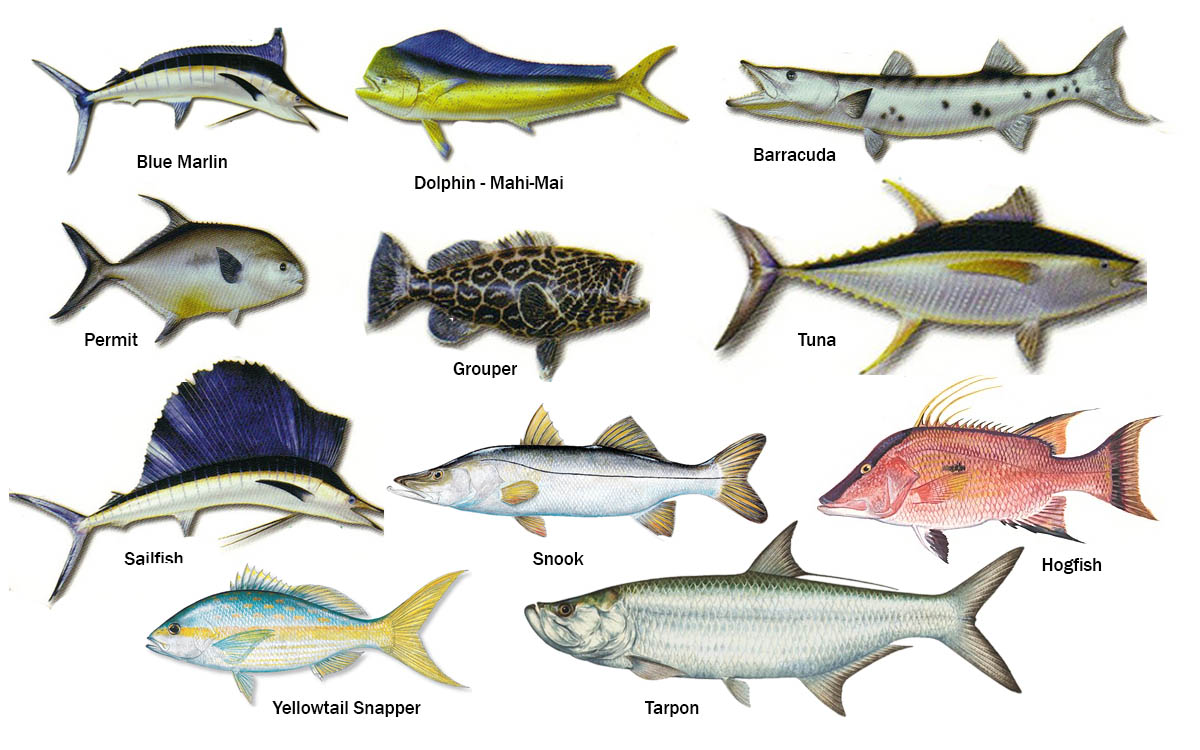The Florida Keys are a very diverse place to fish. You can fish year round, but what you fish, often depends on the season. The beauty of the islands is that you don’t have to wait to plan a spontaneous weekend fishing trip. Throughout the keys there are year- round resident fish and climate dependent fish that migrate to the islands seasonally.
Tarpon – April through June is the traditional “migration” of tarpon through the Florida Keys and Key West.
Sailfish – While sailfish are caught here year round, the peak of the sailfish season is generally in April and May.
Grouper – Many species of grouper can be fished on the reefs, including the Goliath grouper, that was once fished to near extinction. They recently made a surprising re-appearance in the keys, with Captains reporting spotting them around some of the larger shipwrecks.
Snapper – Yellow tail and red snapper are considered gourmet fish, due to their delicious flavor and flaky texture. If you order snapper at a restaurant in most states, expect to pay a premium. But here in the keys they are very plentiful.
Lobster – The Caribbean lobster differs from the Maine lobster, they are smaller, lack front claws, are sweeter and have a better texture. Lobster can only be caught during lobster season. The Season runs from August 6th until March 31st. The bag limit for lobster is 6 per person, per day. Catching lobster is prohibited at all times in certain areas of the keys in Everglades National Park, Dry Tortugas National Park and special no-take areas of the Florida Keys National Marine Sanctuary. To find out more visit www.fknms.nos.noaa.gov.
Dolphin (Mahi Mahi) – Dolphin fishing is very exciting. They are fished by trolling the waters just outside the reefs. Captains look for seabirds, patches of floating seaweed and pushes (excitement in the water, where fish frenzies are occurring) as evidence of their presence. They migrate through keys waters in the summer, and many dolphin fishing tournaments take place throughout the keys in June, July and August.
Tuna – Tuna fishing is not for novices. These large strong fish are notorious for their fight, and take a lot of skill and muscle to land. But for long-time fishing enthusiasts, this can be an exhilarating once-in-a-lifetime experience.
Snook – This species is evasive and challenging to catch. Captains fish for them in the back country near the many mangrove islands.
Bonefish – Bone fishing is as much about the experience as the actual catch. This is finesse fishing at it’s best. Captains in special flat fishing boats travel at lightning speeds across waters only inches deep. Once they find a promising spot, they turn off the engines and pole the boats (pull them slowly along the flats using poles they stick in the mud). Keen eyes and experience are the recipe for success. The shallow waters are often crystal clear, the scenery almost transcendental. For a one-of-a kind fishing experience book a bonefishing charter.
Permit – Permit are fun and ferocious to fish. They are edible, but are fished mainly for sport.
Hog fish – Hog fish are prized by spear fisherman, but are often caught from boats. They are absolutely delicious with a mild white flaky flesh. They are prized by chef’s and there is even a restaurant in Islamorada dedicated strictly to Hogfish dishes.
Lion fish – Lion fish are not an indigenous species, in fact they are a nuisance fish. They were introduced to keys waters by aquarium enthusiasts who dumped them in area canals. As aquarium fish they are valued them for their graceful appearance, they are striped and have long poisonous tendrils that extend outwards from their bodies. But once they were introduced into keys waters, they flourished, as they have no known predators. There are ongoing efforts to eradicate them. They are poisonous to touch, but completely safe to eat.
Marlin – Marlin fishing (also called billfishing) is considered by some game fishermen to be a pinnacle of offshore game fishing, due to the size and power of the species and their relative rareness. There are actually about 10 species of Marlin. They are fished in deep waters well offshore on large seaworthy boats with outriggers, fly bridges and fighting chairs. They are fished strictly for sport. Captains practice “catch and release” practices in the Florida Keys.
Wahoo – Wahoo are similar to tuna. They are strong and swift and take considerable skill to land. They are edible and prized for their abundance of steak like flesh and flavor.
Amberjack – Amberjack are another sport fish that are extremely good fighters. They are found on deeper reefs and wrecks. They are caught mainly for sport. They are edible but not considered prize fish.




